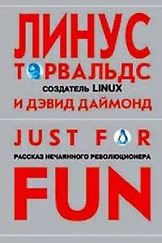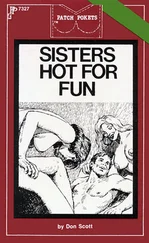Linus Torvalds - Just for Fun
Здесь есть возможность читать онлайн «Linus Torvalds - Just for Fun» весь текст электронной книги совершенно бесплатно (целиком полную версию без сокращений). В некоторых случаях можно слушать аудио, скачать через торрент в формате fb2 и присутствует краткое содержание. Город: NewYork, Год выпуска: 2001, ISBN: 2001, Издательство: HarperCollins Publishers, lnc., Жанр: Программирование, на английском языке. Описание произведения, (предисловие) а так же отзывы посетителей доступны на портале библиотеки ЛибКат.
- Название:Just for Fun
- Автор:
- Издательство:HarperCollins Publishers, lnc.
- Жанр:
- Год:2001
- Город:NewYork
- ISBN:0-06-662072-4
- Рейтинг книги:4 / 5. Голосов: 2
-
Избранное:Добавить в избранное
- Отзывы:
-
Ваша оценка:
- 80
- 1
- 2
- 3
- 4
- 5
Just for Fun: краткое содержание, описание и аннотация
Предлагаем к чтению аннотацию, описание, краткое содержание или предисловие (зависит от того, что написал сам автор книги «Just for Fun»). Если вы не нашли необходимую информацию о книге — напишите в комментариях, мы постараемся отыскать её.
Just for Fun — читать онлайн бесплатно полную книгу (весь текст) целиком
Ниже представлен текст книги, разбитый по страницам. Система сохранения места последней прочитанной страницы, позволяет с удобством читать онлайн бесплатно книгу «Just for Fun», без необходимости каждый раз заново искать на чём Вы остановились. Поставьте закладку, и сможете в любой момент перейти на страницу, на которой закончили чтение.
Интервал:
Закладка:
Back then I was booting into Linux but used Minix as the main development environment. Most of what I was doing under Linux was reading email and news from the university's computer via the terminal emulator I had written. The university computer was constantly busy, so I had written a program that auto-dialed into it. But in December, I mistakenly auto-dialed my hard disk instead of my modem. I was trying to auto-dial /dev/tty1, which is the serial line. But by mistake I auto-dialed /dev/hdal, which is the hard disk device. The end result was that I inadvertently overwrote some of the most critical parts of the of the partition where I had Minix. Yes, that meant I couldn't boot Minix anymore.
That was the point where I had a decision to make: I could reinstall Minix, or I could bite the bullet and acknowledge that Linux was good enough that I didn't need Minix. I would write the programs to compile Linux, under itself, and whenever I felt I needed Minix I would just add the desired feature to Linux. It's a big conceptual step when you drop the original hosting environment and truly make a program self-hosting, so big that I released the new version as 0.10 in late November. A few weeks later came version 0.11.
That's when there actually started to be a number of people using it and doing things with it. Until then, I had gotten maybe one-line bug fixes. But now, people were sending me new features. I remember going out and upgrading my machine to have 8 mgs of RAM instead of 4 mgs, to accommodate the need for additional memory. I also went out and bought a floating-point coprocessor because people had started asking me if Linux would support their floating-point coprocessors. The extra hardware would enable my computer to perform floating-point math.
I remember that, in December, there was this guy in Germany who only had 2 megabytes of RAM, and he was trying to compile the kernel and he couldn't run GCC because GCC at the time needed more than a megabyte. He asked me if Linux could be compiled with a smaller compiler that wouldn't need as much memory. So I decided that even though I didn't need the particular feature, I would make it happen for him. It's called page-to-disk, and it means that even though someone has only 2 mgs of RAM, he can make it appear to be more by using the disk for memory. This was around Christmas 1991. I remember on December 23rd trying to make the page-to-disk work. By December 24th, it kind of worked but crashed every once in awhile. Then on December 25th, it was done. It was basically the first feature I added to serve somebody else's need.
And I was proud of it.
Not that I mentioned anything about it to my family, as we gathered at my paternal grandmother's (Farmor!) to dine on ham and varieties of herring. Each day, the community of Linux users expanded, and I was receiving email from places that I'd dreamed about visiting, like Australia and the United States. Don't ask me why, but I didn't feel the need to discuss any of this with my parents, sister, or any other relatives. They didn't understand computers. I guess I thought they wouldn't understand what was happening.
As far as they were concerned, I was just tying up the phone lines with my modem. In Helsinki it used to be that you had a flat rate during the night, so I tried to do most of the work at home late at night. But occasionally I tied up the phone all day. I tried to get a second line, but the building that housed my mother's apartment was so old that they didn't have any extra lines and weren't interested in adding new ones. Sara was doing nothing but talking on the phone with her friends at the time. At least that's what it seemed like to me. Sowe had fights, occasionally. Virtual fights. As she talked to her friends, I would force the modem to start dialing so that she would hear dee-dee-dee-dee-dee when I was trying to dial out. It would disturb her but she would know that I really, really needed to read email. I never said I was the world's best older brother.
Page-to-disk was a fairly big thing because it was something Minix had never done. It was included in version 0.12, which was released in the first week of January 1992. Immediately, people started to compare Linux not only to Minix but to Coherent, which was a small Unix clone developed by Mark Williams Company. From the beginning, the act of adding page-to-disk caused Linux to rise above the competition.
That's when Linux took off. Suddenly there were people switching over from Minix to Linux. At the time, Linux didn't do everything Minix did, but it did most of the things people really cared about. And it had this one capability that people really, really cared about: With page-to-disk, you could run bigger programs than you had memory for. It meant that when you ran out of memory you could take an old piece of memory, save it off to disk, remember where you saved it, and reuse that memory for the problem you had to solve. This was a big deal in the opening weeks of 1992.
It was in January that Linux users grew from five, ten, twenty people -- folks who I could email and whose names I knew -- to hundreds of unidentifiable people. I didn't know everybody using Linux, and that was fun.
About this time there was a hoax speeding its way on the Internet. Some poor boy named Craig was dying of cancer and a popular chain letter urged you to show your support by sending him a postcard. It turned out to be somebody's idea of a sick joke; I don't think Craig ever really existed, much less suffered from cancer. But the appeal generated millions of postcards. So I was only half-serious when I asked for postcards instead of money from people who used Linux. It was like an oh-God-not-another-email-that-asks-for-postcards joke. In the PC world at the time, there had been a strong tradition of shareware. You downloaded a program and you were supposed to send in something on the order of ten bucks to the writer. I was getting emails from people asking me if I would like them to send me thirty bucks or so. I had to say something.
Looking back, the money would have been useful, I guess. I had amassed something like $5,000 in student loans, and had to shell out about $50 a month to payoff my computer. My other major expenditures were pizza and beer. But Linux was keeping me so preoccupied that I wasn't going out much at the time, maybe once a week at most. I didn't need money for dates although I could have used it for hardware add-ons, but that wasn't necessary. Probably a different son would have asked for money for his program, if only to fork over some rent to his working single mom. It never occurred to me at the time. Sue me.
I was more interested in seeing where people were using Linux. Instead of cash, I preferred postcards. And they poured in-from New Zealand, from Japan, from the Netherlands, from the United States. It was Sara who typically picked up the mail, and she was suddenly impressed that her combative older brother was somehow hearing from new friends so far away. It was her first tip-off that I was doing anything potentially useful during those many hours when I had the phone line engaged. The postcards totaled in the hundreds, and I have no idea what happened to them. They must have disappeared in one of my moves. Avuton calls me "the least nostalgic person" he has ever met.
Actually, I didn't want the money for a variety of reasons. When I originally posted Linux, I felt I was following in the footsteps of centuries of scientists and other academics who built their work on the foundations of others-on the shoulders of giants, in the words of Sir Isaac Newton. Not only was I sharing my work so that others could find it useful, I also wanted feedback (okay,and praise). It didn't make sense to charge people who could potentially help me improve my work. I suppose I would have approached it all differently if I hadn't been raised in Finland, where anyone exhibiting the slightest sign of greediness is viewed with suspicion, if not envy. (This has changed a bit since the days when Nokia phones started making their way into pockets the world over, boosting the bank accounts of numerous Finns.) And, yes, I undoubtedly would have approached the whole no-money thing a lot differently if I had not been brought up under the influence of a diehard academic grandfather and a diehard communist father.
Читать дальшеИнтервал:
Закладка:
Похожие книги на «Just for Fun»
Представляем Вашему вниманию похожие книги на «Just for Fun» списком для выбора. Мы отобрали схожую по названию и смыслу литературу в надежде предоставить читателям больше вариантов отыскать новые, интересные, ещё непрочитанные произведения.
Обсуждение, отзывы о книге «Just for Fun» и просто собственные мнения читателей. Оставьте ваши комментарии, напишите, что Вы думаете о произведении, его смысле или главных героях. Укажите что конкретно понравилось, а что нет, и почему Вы так считаете.












